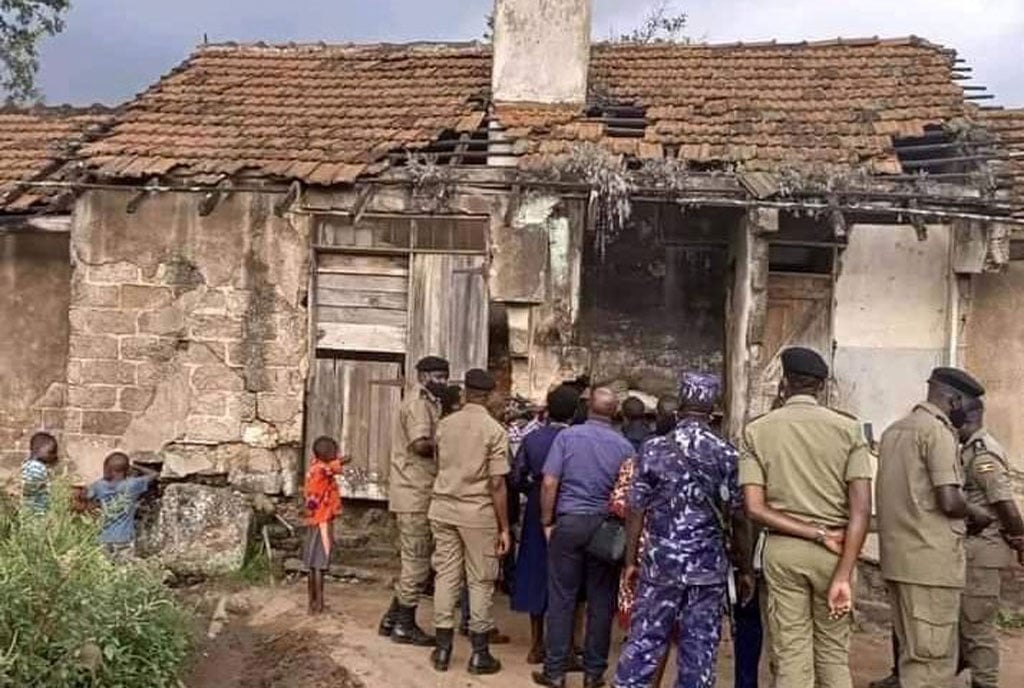
Police officers inspect Police housing units in Uganda recently. PHOTO/ FILE
Despite the government having poured considerable resources into the construction of more than 420 apartments in Naguru and putting up several housing units in diverse parts of the country over the last couple of years, up to 53 percent of police officers do not have decent accommodation.
The report of the Auditor General for the period ending June 2024 points out that as a result, most of the affected officers have been compelled to live in unsafe environments.
“At the time of reporting [in November 2024], 53.1 percent of the 38,460 entitled officers had no adequate accommodation. Consequently, many officers were forced to live in substandard conditions that pose safety risks,” the report says.
Mr Kituuma Rusoke, the spokesperson of the Uganda Police Force (UPF), told Monitor on Friday that he had brought the audit queries “to the attention of the responsible officer.” By press time, the Force had not yet reverted to us.
The report, which describes the police’s accommodation woes as “a persistent housing crisis,” adds that the situation has been exacerbated by efforts by the government to shore up the numbers of the Force. This is as the government moves to be able to achieve the police-to-population ratio recommended by the United Nations (UN). The UN recommended ratio is one police officer for every 220 people. Figures from the Uganda Gazette indicate that the police-to-population ratio for Uganda stands at one officer for every 812 Ugandans, an improvement from the ratio of one officer for every 941 Ugandans about four years ago.
The report adds that initiatives such as the eviction of unauthorised occupants from police barracks across the country and improved management practices through enforcement of standard operating procedures (SOPs) have not helped much in addressing the Force’s accommodation issues.
In November 2023, the police evicted squatters on its land in Nakawa and Kira Municipality amid claims that the number of illegal settlers on its land was on the increase. The Auditor General now suggests that such efforts have not helped much.
Lack of funds
The report notes that whereas the police force’s decision to emphasise relying on its own engineering unit has helped
reduce construction periods from as long as three years to periods as short as six months for projects, perpetual lack of
funds is pegging back efforts by the force to address its housing deficits.
“Funding constraints continue to impede progress, with delays in disbursement affecting the completion of vital construction projects. The need for more housing units is urgent, particularly as recruitment efforts continue to increase,” the report adds.
The report suggests that budget cuts, which have in recent times been reported to have become an impediment to
the Force’s operations have also affected its ability to address the housing problems as funds that had initially been ear-
marked for addressing the Force’s housing needs were instead expended on operational matters.
“Funds amounting to Shs1.17b meant for acquiring non-residential buildings were spent on vehicle maintenance, repairs and feeding,” the report notes.
The report suggests that funds that had been meant for the procurement of land and construction of a police hospital and accommodation blocks in Nsambya and other district police stations had also not been spared.

Some of the housing units for police officers at Kira Road Police Station in Kampala on June 7, 2023. Officers in Tororo say accommodation at the police housing units is not conducive. PHOTO/ ABUBAKER LUBOWA.
Mr Aggrey Wunyi, the Under Secretary of the Uganda Police Force, however, disagreed with the conclusions of the report.
“There were no funds meant for accommodation to operational matters. All those matters were explained,” Mr Wunyi
told Monitor.
Redundant resources
The Auditor General points to the need to address funding and increased investment if the Force’s accommodation challenges are to be overcome.
“While the UPF has demonstrated a commitment to improving housing conditions through ongoing construction and renovation projects, significant gaps remain. Addressing the funding challenges and enhancing management
practices are crucial in ensuring all entitled officers access safe and adequate housing. Continued investment and strategic planning are essential to meeting the growing demands of the force and improving the overall welfare for police personnel in the country,” the report says.
The same report also called out the Force for procuring equipment that it has never put to use. The report for example notes that whereas the Police Force had in the financial year 2021/2022 spent just under Shs1.1 billion on the procurement of equipment meant to enhance the performance of the Inspectorate of Vehicles, the equipment has been lying idle in its stores.
“UPF procured equipment worth Shs1.059 billion to enhance the performance of the Inspectorate of Vehicles department, including equipment for piloting the automation of vehicle inspections at the Naguru IOV (Inspectorate of Vehicles) station, but these were not yet deployed for use by the time of this audit,” the report notes.
No dogs upcountry
The report further alludes to the poor deployment of dogs and other resources under the Force’s canine unit.
“UPF has 280 dogs in the police canine unit, however, the dogs are concentrated in Kampala, and the number of dog handlers was not aligned with the other resources, including transport facilities, kennels, and dog handler trainers,” the report says.
This is the second time in as many years that the Auditor General has raised matters around the Force’s canine unit.
The same office pointed out in the report for the period ending June 2023 that police dogs were deployed in only 88 policing districts/stations out of 184 policing districts nationwide, which represented a coverage of only 48 percent of the country.
The 2023 report also noted that the force had 305 dog handlers compared to the requirement of 418 dog handlers to cater for all 209 dogs, each with two handlers.
The report further noted that none of the dog handlers had undergone any refresher training courses, and that the canine unit had 30 vehicles, eight of which were grounded due to mechanical issues.
The same report further pointed out that dog kennels in 16 out of the 88 policing districts and police stations that have canine services were in a “sorry state” and, therefore, “ exposing dogs to poor living conditions”.
The latest report has now brought a whole new dimension to the discussion around the canine unit by pointing out that the force also has not written Memoranda of Understanding for guidance with collaborations with other government agencies and departments like the Ministry of Agriculture, Animal Industry and Fisheries, the Ministry of Health or district veterinary and health departments on which it relies for the treatment of dogs and human ailments that might be related to the dogs.
Marine troubles
The report further points to weaknesses in the operations of the Police Marine Unit.

IGP Abbas Byakagaba inspects a guard of honor upon arrival at the Police Marine Base for the pass out of out 53 marine police officers in Kigo, Wakiso district on August 30, 2024. PHOTO/FILE/PAUL ADUDE
The document points out that the unit had only been able to respond to 210 out of the 745 incidents reported on water bodies, which represents performance levels of only 28 percent.
During those incidents, the report notes that 323 people were rescued and 243 dead bodies were retrieved. The report blames the poor performance on several factors, key among them underfunding.
“The marine unit’s workforce has insufficient resources, including finances, skilled manpower and boats which resulted in poor maintenance of the marine vessels. 18 out of the unit’s 60 vessels were nonfunctional and the unit does
not have a well-constructed Marina,” the report says.
This is the second year running that the Auditor General is raising issues around the troubles of the marine unit. The Auditor General’s report for the period ending June 2023 reported that 13 out of the 60 boats available to the Marine Police were also found to have been grounded, leaving only 46 boats for the force to use in patrolling, monitoring and handling security on the country’s water bodies.

